
World War I ended and Hitler was mad that Germany lost and blamed it all on the Jews. He joined the National Socialist German Workers Party and attempted a coup called the "Beer Hall Putsch" to try to bring down the democratic government in Germany. He failed and hid out in a friend's attic until he was arrested and taken to jail where he was about to go on trial for high treason.
Hitler practically became famous over night, not just locally but in other countries as well. The lay judges( a person assisting a judge in a trial) in his trial was chosen by a Nazi sympathizer in the Bavarian government. Hitler was allowed say whatever he wanted for as long as he wanted and he'd interrupt others at any time and even cross examine witnesses.
Hitler's trial began before the special People's Court in Munich in February of 1924. Amazingly he said that he was the only to blame for the Putsch. However, he did claim that what he did was not wrong.
"I alone bear the responsibility. But I am not a criminal because of that. If today I stand here as a revolutionary, it is as a revolutionary against the revolution. There is no such thing as high treason against the traitors of 1918," Hitler ranted.
The lay judges had to be dissuaded by the presiding Judge, George Neithardt, from acquitting Hitler with the that he would get early parole. On April 1st, 1924, he was found guilty and he could have received life, but he got five years and would be eligible for parole in six months.
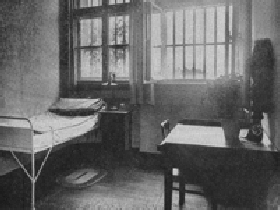
He was given a private cell at Landsberg with a nice view. He received friendly treatment from the guards, and was allowed mail and regular visits by anyone. He got gifts and had his own private secretary. Hitler also dictated what would be the first volume of a book, Mein Kampf, to his secretary who took down every word. Hitler never did write an actual word of his book.
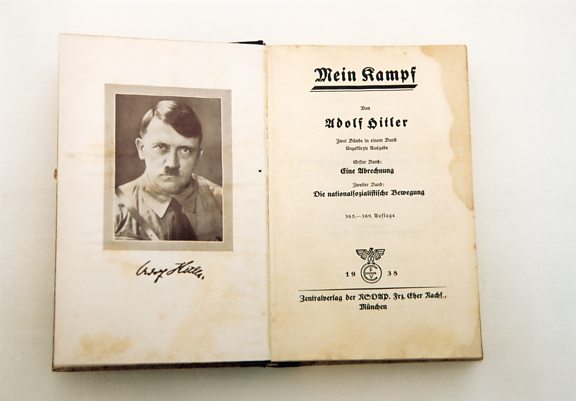
Mein Kampf (My Struggle, or My Battle) was originally going to be called "Four and a Half Years of Struggle against Lies, Stupidity and Cowardice", but his publisher shortened it.
In his book, Hitler establishes higher and lower orders of humans. At the top is the Germanic man with his fair skin, blond hair and blue eyes. Hitler refers to this type of person as an Aryan asserts that it is the master race. Hitler then declared that Jews and the Slavic peoples, notably the Czechs, Poles, and Russians are the lowest on the totem pole, the inferior races. He also said that the inferior races actually benefit by being conquered because they come in contact with and learn from their superiors. However, they can't get married, have kids together and taint the pure Aryan bloodline...
Hitler also claimed that the Jews were conspiring to keep the Aryan's from assuming their rightful position as rulers of the world. He said that the Jews were conducting an international conspiracy to control world finances, controlling the press, inventing liberal democracy as well as Marxism, promoting prostitution and using culture to spread disharmony. Throughout his book Hitler insults Jews and calls them the mortal enemies of the Aryans.
Anyway, Hitler wasn't the only one who was shown incredible mercy and kindness by the court. Other Nazi leaders got light sentences as well and General Ludendorff was even acquitted.
Hitler was Pardoned by the Bavarian Supreme Court and ending up only serving a little over eight months. Against the prosecutor's objections, he was released on December 20th, 1924.
Hitler was worried that he was going to be deported, but the judge was sympathetic and said that he couldn't apply the rules to a man that thought like Hitler did and loved Germany so much...
After his release Hitler would make his money from party funds and from writing for nationalist newspapers. He became a night owl that wouldn't eat meat and he also gave up alcohol.
The Germany economy had started to recover a bit and the political aspect agitation had eased as well. Also, the Nazi Party and its affiliated organizations had been banned in Bavaria.
On January 4th, 1924, in a meeting with the Prime Minister of Bavaria Heinrich, Hitler agreed to respect the state's authority and promised that he would seek political power only through the democratic process. The meeting paved the way for the ban on the NSDAP to be lifted. However, after an inflammatory speech Hitler was barred from public speaking by the Bavarian authorities. In spite of the ban, Hitler appointed Gregor Strasser, Otto Strasser and Joseph Goebbels to organize and enlarge the NSDAP in northern Germany.
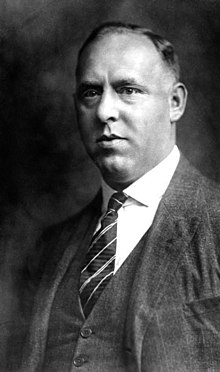
Gregor Strasser was born into the family of a Catholic judicial officer. He served an apprenticeship as a pharmacist in the Lower Bavarian village of Frontenhausen.
When World War I broke out, Strasser suspended his studies at Ludwig Maximilian University of Munich to enlist as a volunteer in the German Imperial Army. He served in the 1st Bavarian Field Artillery Regiment. rising quickly to the rank of first lieutenant and winning the Iron Cross of both classes for bravery. In 1918, he resumed his studies at Friedrich-Alexander-University, Erlangen-Nuremberg. He passed his state examination and started work as a pharmacist in Landshut.
He joined the NSDAP in 1920 and quickly became an influential and important figure. He took part in the Beer Hall Putsch and was imprisoned, but released because he had been elected a member of the Bavarian Landtag for the NSDAP.
Because Strasser was overworked and hired Heinrich Himmler to expand the organization in Lower Bavaria. After the refoundation of the NSDAP, Strasser became the party leader of a regional branch of the Nazi Party. From September 1926 until the end of December 1927, he was the NSDAP's national leader for propaganda.
Due to the public-speaking ban issued against Hitler, Hitler deputized Strasser to represent the party in the north and speak. Strasser said in his speech he made to the Reichstag in November 1925:
"We National Socialists want the economic revolution involving the nationalization of the economy...We want in place of an exploitative capitalist economic system a real socialism, maintained not by a soulless Jewish-materialist outlook but by the believing, sacrificial, and unselfish old German community sentiment, community purpose and economic feeling. We want the social revolution in order to bring about the national revolution."
Strasser with his brother Otto, founded the Berlin Kampf-Verlag ("Combat Publishing"). Strasser appointed Joseph Goebbels as the managing editor of the Kampfverlag. The two men drafted a revised version of the NSDAP political program during the winter of 1925–1926, one which leaned much further to the left much to Hitler's dismay. Hitler called for a meeting in the northern Bavarian city of Bamberg. Goebbels and Strasser traveled there hoping to convince Hitler of the new message but it didn't work.
In March of 1926 Strasser was in a car accident and he was bedridden for awhile.
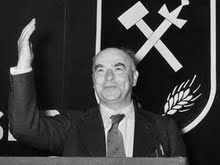
Otto Strasser was Gregor's brother and was considered more intellectual of the two. During World War I he joined the Bavarian Army as a volunteer. He rose through the ranks to lieutenant and was twice wounded. When he returned to Germany in 1919 he served in the Freikorps. At the same time, he also joined the NSDAP. In 1920 he participated in the opposition to the Kapp Putsch.

Joseph Goebbels was born in an industrial town called Rheydt. Both of his parents were Roman Catholics. His father was a German factory clerk and his mother was of Dutch ancestry and later became a German citizen. Goebbels had five siblings. His sister Maria married the German filmmaker Max W. Kimmich. (I don't know if they are all that way, but he made several propaganda films for the Nazis.)
As a child Goebbels suffered from a long bout of inflammation of the lungs. He also had a deformed right foot that turned inwards, due to a congenital deformity. It was thicker and shorter than his left foot and he underwent a failed operation to correct it. Goebbels wore a metal brace and special shoe because of his shortened leg and walked with a limp. He was rejected from serving in World War 1 because of his disability.
Goebbels studied literature and history aided by a scholarship from the Albertus Magnus Society. Goebbels parents wanted him to become a catholic priest but by this time he had begun to distance himself from the church.
At Freiburg, he met and fell in love with Anka Stalherm, who was three years older. By 1920 their relationship was over and Goebbels was full with thoughts of suicide.
Goebbels earned his PhD in 1921.
Goebbels returned home and worked as a private tutor. He met and began a love affair with a school teacher named Else Janke. After she revealed to him that she was half-Jewish, Goebbels stated his disdain, but continued dating her on and off for years.
He continued for several years to try to become a published author, but his lack of success forced him to take employment as a caller on the stock exchange and as a bank clerk. He was dismissed from the bank in August 1923 and returned to Rheydt. He began reading avidly and was influenced by the works such as Houston Stewart Chamberlain's book The Foundations of the Nineteenth Century. (One of the standard works of the extreme right in Germany.) He also began to study the "social question" and was preoccupied with "religious-philosophical" issues, and lacked a sense of direction.
Goebbels was drawn to the NSDAP mostly because of Hitler. Gregor Strasser hired Goebbels to work on their weekly newspaper and undertake secretarial work for the regional party offices. He was also put to work as party speaker.
Hitler believed in a legal system with no "Jewish system of exploitation ... for plundering of our people." The future would be secured by acquiring land, not through expropriation of the estates of the former nobility, but through colonizing territories to the east. Goebbels was horrified by Hitler's characterization of socialism as "a Jewish creation."
After reading Hitler's book Goebbels began to see Hitler's point of view and began to really idolize him.
Hitler appointed Goebbels the leader for the Berlin section giving him great authority over the area. When Goebbels arrived, and he reduced it to a core of 600 of the most active and promising members. To raise money, he instituted membership fees and began charging admission to party meetings. To get publicity he deliberately provoked beer-hall battles and street brawls. Goebbels used commercial advertising including the use of catchy slogans and subliminal cues.
Goebbels' violent tactics led the Berlin police to ban the NSDAP from the city. Violent incidents continued, including young Nazis randomly attacking Jews in the streets. Goebbels was subjected to a public speaking ban until for a while. During this period, he founded the newspaper Der Angriff (The Attack). Material in the paper was highly anti-communist and antisemitic.
The ban on the NSDAP was lifted before the Reichstag elections in 1928. Goebbels gained election to the Reichstag. This gave him immunity from prosecution for a long list of outstanding charges.
Back to Hitler after he was released from prison.
Hitler's sister Angela had been working for him as a housekeeper and she would bring along her teenage daughter Geli.

Angela Maria "Geli" Raubal was known as a high-spirited young girl with an infectious charm. She was born in Linz, Austria-Hungary. She had a brother named Leo and a sister named Elfriede. Her father died at the age of 31 when Geli was two.
Elfriede would also accompany their mother when she went and worked for Hitler, but it was a 17-year-old Geli that Hitler would favor.
Hitler attended Rudolph Hess' wedding as his best man. Hitler ducked out early with his chauffeur, Emil Maurice and went to a tavern. The two got to talking and Hitler was shocked and outraged when Maurice told him that he was engaged to Geli. The next day Hitler spoke with Maurice and Geli. The conversation didn't go very well and Hitler ended up threatening Maurice with a gun and throwing him out the door. Needless to say Maurice was also fired.
In 1929 Geli moved in with Hitler when she enrolled in medicine at Ludwig Maximilian University. She did not complete her medical studies. Hitler was domineering and possessive. He cut her off from all of her friends and would accompany her everywhere she went. When he couldn't be with her he'd make sure there was someone he could trust to keep her in line. This made Geli rightfully lonely and depressed.
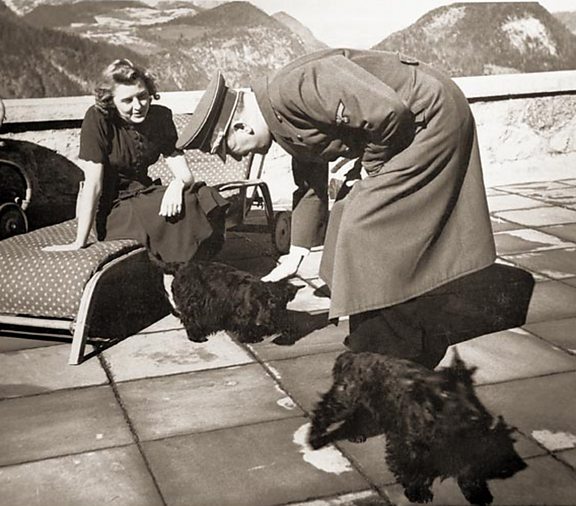
Around this time Hitler first met a 17-year-old German Catholic girl called Eva Braun.
Eva Anna Paula Braun was born in Munich and was the second daughter of school teacher Friedrich "Fritz" Braun and a hard working seamstress Franziska "Fanny" Kronberger. She had an elder sister, Ilse and a younger sister, Margarete (Gretl).
Braun's parents were divorced in April 1921, but remarried in November 1922. Braun was educated at a Catholic lyceum in Munich, and then for one year at a business school in the Convent of the English Sisters in Simbach am Inn, where she had a talent for athletics. It was said that she was an accomplished swimmer and skier.
She was 17-years-old when she took a job working for Heinrich Hoffmann, the official photographer for the NSDAP. Initially employed as a shop assistant and sales clerk, she soon learned how to use a camera and develop photographs. She met Hitler at Hoffmann's studio in Munich. Soon Braun and Hitler became involved in a secret relationship.
The stock market crash in the United States in October of 1929 direly impacted Germany. Millions were thrown out of work and several major banks collapsed. Hitler and the NSDAP decided to take advantage of the situation. They promised to reject the Versailles Treaty, strengthen the economy, and provide jobs.
The Great Depression and the German referendum(a failed attempt to introduce a Law against the Enslavement of the German People) of 1929 elevated the Nazi ideology. The elections of 1930 resulted in the break-up of a grand coalition (an arrangement in a multi-party parliamentary system in which the two largest political parties of opposing political ideologies unite in a coalition government) and its replacement with a minority cabinet. (Minority cabinets tend to be less stable.)

Chancellor Heinrich Brüning of the Center Party, governed through emergency decrees from President Paul von Hindenburg.
Brüning was born in Münster. He lost his father when he was one year old and so his older brother Hermann was like a father to him. Although brought up in a devoutly Roman Catholic family, Brüning was also influenced by Lutheranism's concept of duty.
He first leaned towards the legal profession but then studied Philosophy, History, German and Political Science at Strasbourg. In 1915, he received a doctorate for his thesis on the financial, economical and legal implications of nationalizing the British railway system. Historian Friedrich Meinecke, one of his professors at Strasbourg with national liberal and anti-semitic views, was a major influence on him.
Brüning volunteered for the infantry and even though he has shortsightedness and was physically weak, he was accepted. He served in World War I and rose to lieutenant in an infantry regiment and company commander by the end of the war. He was cited for bravery and awarded both the second and first class Iron Cross.
Despite having been elected to a soldiers' council after the armistice, Brüning did not approve of the German Revolution.
He preferred to help former soldiers reintegrate into civilian life by assisting them finding employment or further their education.
He collaborated with the social reformer Carl Sonnenschein and worked in the "Secretariat for social student work". After six months he entered the Prussian welfare department and became a close associate of the minister. The minster made Brüning chief executive of the Christian unions.
As the editor of the union newspaper Der Deutsche (The German), he advocated a "social popular state" and "Christian democracy."
In 1923 Brüning was actively involved in organizing the nonviolent resistance campaign "Ruhrkampf".
Brüning joined the Center Party and was elected to the Reichstag, representing Breslau. In parliament, he quickly made a name for himself as a financial expert and managed to push through the Brüning Law, which restricted the workers' share of income taxes.
After his election as leader of the Center Party group in the Reichstag, his party's agreement to the Young Plan was made conditional on paying for it through tax increases and budget cuts.
Brüning was then appointed chancellor by Hindenburg and had the economic crises caused by the Great Depression to deal with. Brüning's tightening of credit and a rollback of all wage and salary increases really made him unpopular. This paved the way for the NSDAP to win 107 parliamentary seats and they became the second-largest party in parliament.
The Nazi party was on a steady rise and so was the turmoil between Geil and an obsessed Hitler. Geli dreamed of becoming a singer someday and wanted to go to escape to Vienna and marry a man there and settle down. Hitler wanted her all to himself and wouldn't allow her to leave him.
On September 18th, 1931, as Hitler was leaving for a meeting in Nuremberg, Geli hung out of the window and yelled something to Hitler. He replied, “No, for the last time, no.”
The next day Hitler was recalled to Munich the next day with the news that 23-year-old Geli was dead. She had been found lying face down on the floor in a pool of blood. She had a hole in her chest where a bullet from Hitler's pistol had obliterated one of her lungs. There was no suicide note, just an enthusiastic letter about future plans to a friend was found, half-written, on her desk.
Geli's death was ruled a suicide. The cause was stated as “unsatisfied artistic achievement.” Oddly, she was buried in a catholic cemetery in Vienna, where suicide cases aren’t allowed.
It was said that Geli's death made Hitler very depressed and moved to a house on the shores of Tegernsee lake. And he did not attend the funeral in Vienna, but he often visited her grave after. Later he declared that Geli was the only woman he had ever loved. Her room at the Berghof was kept as she had left it, and he hung portraits of her in his own room as well as his office.
Many theories even to this day swirl around about Geli's death. Some say that she was driven to suicide by not only Hitler's controlling nature, but that she was sexually abused by him. Other say that Hitler shot Geli himself in the heat of an argument or killed on his orders. Allegedly, Hitler's nephew William Stuart-Houston claimed, "When I visited Berlin in 1931, the family was in trouble. ... Everyone knew that Hitler and she had long been intimate and that she had been expecting a child – a fact that enraged Hitler."
After Geli's "suicide" Braun too attempted suicide by shooting herself in the chest with her father's pistol. She had been deeply committed to her relationship with Hitler, but Hitler spend a great amount of his time on his political career and Braun felt ignored.
After Braun's recovery, Hitler became more committed to her and set her up in a spacious Munich house with a maid. However, Hitler wouldn't let Braun be seen with him in public.The only time Braun could appear on his arm as "chief consort" was when she was playing host to his inner circle.
After Hitler had terminated his Austrian citizenship in 1925, he was stateless, legally unable to run for public office, and still faced the risk of deportation. On February 25th, 1932, the interior minister of Brunswick, who was a member of the NSDAP, appointed Hitler as administrator for the state's delegation to the Reichsrat in Berlin, making Hitler a citizen of Brunswick.
After obtaining citizenship, Hitler decided against Hindenburg in the 1932 presidential elections.
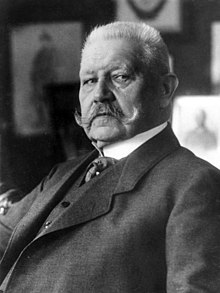
Hindenburg was born in what is now Poznan, Poland. His father was a member of the Prussia nobility and supported the family as an infantry officer and retired as a major. His family were all Lutheran Protestants in the Evangelical Church of Prussia.
He tried to emulate everything about his father that he could and at age 11 Hindenburg entered the Cadet Corps School. And by age 19 he first saw war.
Hindenburg won a decoration during the Austro-Prussian War after he marched on after temporarily knocked unconscious by a bullet that pierced his helmet. And later he became will distinguished in the Franco-Prussian War.
He wrote the field service regulations on field-engineering and on the use of heavy artillery in field engagements.(Both of which were used during the First World War.)
He served in the General Staff with his appointment of 1878. While there he was made a general in 1905.
Hindenburg retired in 1911 so that he could spend time with his wife and children and "to make way for younger men." He had been in the army for 46 years, including 14 years in General Staff positions.
He was called back into military service after the start of World War I to assume command of the German Eighth Army in East Prussia with General Erich Ludendorff as his chief of staff.
Hindenburg won a huge victory for Germany at Tannenburg and eight hundred thousand refugees were able to return to their East Prussian homes. After this, Hindenburg was appointed Commander-in-Chief of the German armies.
Hindenburg was appointed Ober Ost (commander in the east) and was promoted to field marshal.
In a raging snowstorm his forces surprised the Russian flank in the Battle of Łódź, which ended the immediate Russian threat to Silesia and also captured Poland's second largest city.
Hindenburg argued that the Russians could be snared in a cauldron by a southward pincer from East Prussia and a northward pincer from Galicia, using motor vehicles for speed, even though the Russians outnumbered the Germans by three to one. He thought that this could end the war in the Eastern Front. Erich von Falkenhayn, the Chief of Germany's Great General Staff, rejected his plan.
Hindenburg then made plans to eliminate the Russians' remaining toehold in East Prussia by ensnaring them in a pincer movement between the Tenth Army in the north and Eighth Army in the south. It worked and Hindenburg's forces encircled an entire corps and captured more than 100,000 men in the Second Battle of the Masurian Lakes.
During the German offensive to relieve Russian pressure on the Austro-Hungarians to their south, Hindenburg's Ninth and Tenth Army launched diversionary attacks. Three cavalry divisions swept east into Courland, the barren, sandy region near the Baltic coast.
Hindenburg was then ordered to launch a frontal attack in Poland toward the Narew River north of Warsaw. He created Army Group Gallwitz and broke through the Russian lines. One-third of the opposing Russian First Army were casualties in the first five hours and the Russians ended up withdrawing.
Hindenburg continued to rack up victories on the Eastern Front and consequently he was promoted to Field Marshal, finally becoming Army Chief of Staff, replacing Falkenhayn. He immediately appointed Ludendorff his Quartermaster General.
Hindenburg formed what was known as the "Third Supreme Council", a military-industrial dictatorship that held virtually total power.
In 1918, Hindenburg oversaw Germany's largest offensive push of World War I. Russia had already withdrew from the war and Hindenburg believed that by bringing troops from the Eastern Front they had the means to not only halt the Allies, but to push them back. It was a costly offensive that almost succeeded, however an Allied counter-offensive, bolstered by the arrival of U.S. troops, broke through, forcing German to surrender.
In June of 1919, Hindenburg retired once again from the German army, but remained in office. Under the terms of the Treaty of Versailles Hindenburg was due to be tried as a war criminal; however he was a war her and his popularity ensured that he was not even indicted.
In 1925 Hindenburg became President of the Weimar Republic, replacing Friedrich Ebert upon the latter's death.
In 1930 when the depression hit, he appointed a cabinet accountable only to him and authorized Chancellor Heinrich Brüning to dissolve the Reichstag.
Back to the 1932 race between Hitler and Hindenburg for president. Many of Germany's most powerful industrialists supported Hitler and various nationalist, monarchist, Catholic, and republican parties, and some Social Democrats supported Hindenburg.
Hitler's campaign slogan was "Hitler über Deutschland" ("Hitler over Germany") and was one of the first politicians to use aircraft travel effectively and for political purposes. He targeted his political messages specifically at people who had been affected by the inflation and the Depression, such as farmers, war veterans, and the middle class.
Hitler ultimately lost to Hindenburg, but the election established Hitler as a strong force in German politics.
Two influential politicians, Franz von Papen and Alfred Hugenberg, along with several other industrialists and businessmen, wrote a letter to Hindenburg urging him to appoint Hitler as Chancellor. Hindenburg reluctantly agreed.
Hitler's government brought the Ermächtigungsgesetz (Enabling Act) to a vote in the newly elected Reichstag and it passed. Hitler now had the ability to pass laws without Reichstag approval. Political parties, organizations and unions not affiliated with the Nazis were soon disbanded. Hitler now basically had ultimate power.

No comments:
Post a Comment